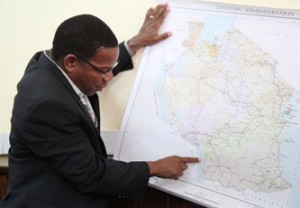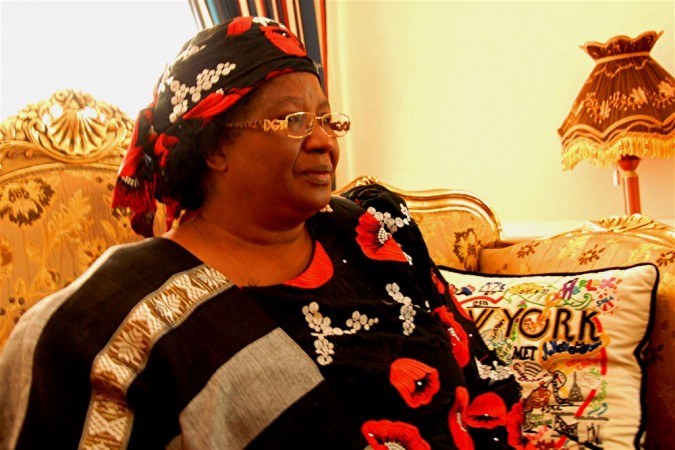There are fears that conflict
might be looming between
Malawi and Tanzania over
the ownership of a portion
of Lake Malawi – or rather
of the oil reserves that are believed
to lurk beneath its
waters. The dispute arose
55 years ago but receded
after Malawi made it clear
that Tanzania did not have
any rights over any section of the
Lake. However,
tensions remained – and
Tanzania has steadfastly
stuck to the old colonial
name for the lake, referring
to it as Lake Nyasa. The peaceful
status quo
remained until around 2005
when rumours started
surfacing that there was oil
under the lake. In October
2011, Malawi awarded a licence to
Surestream
Petroleum, a UK based firm,
to commence oil
exploration on the lake. Prodded into
action by the
thought of all that potential
oil wealth, Tanzania
recently resurrected its
claims to 50 percent of the
portion of the lake that forms its
borders with
Malawi – sparking outrage
and an escalating war of
words. It is common knowledge
that African boundaries
were drawn by former
colonial powers. The
border between Malawi and
Tanzania was set out in the treaty
signed by Britain
(representing Malawi) and
Germany (representing
Tanzania) in the Anglo-
German Heligoland
Agreement of 1 July 1890. This critical
agreement
demarcated the boundaries
involving a number of
territories under British and
Germany control, such as
Tanzania, Malawi, Kenya, Ghana,
Chad, Togo,
Cameroon and Congo,
among others. Article 1 paragraph 2
of the
Heligoland Treaty provides
that the Malawi and
Tanzania boundary runs ‘…
along the eastern,
northern, and western shores of the
lake until it
reaches the northern bank
of the mouth of the Songwe
River. It then continues up
that river to its intersection
point with the 33rd degree of east
longitude’. It all seems pretty clear
since the Treaty draws the
boundary along the shores
of Lake Malawi thereby
giving the entire body of
water to Malawi. However, maps
drawn
between 1922 and 1964
are inconsistent and
inconclusive. Some maps
show the shoreline border,
while others show the border lying
along the
median line in the lake.
Others do not indicate the
borders at all. And there
was also a confusing debate
about whether or not Britain had
altered the
borders twice in the
decades after it took
control of Tanzania
following the defeat of
Germany in the First World War –
once to draw it
through the lake and then
to return it to the shoreline. But by
the time of Malawi’s
independence in 1964, the
consensus was that the
border was along the shore
even though Tanzania was
never comfortable with – or convinced
by – this
position. Indeed, Tanzania
raised the issue with Malawi
again in 1967 but the
countries did not settle the
dispute. After that the issue lay
dormant until this year,
when Tanzania asked
Malawi to halt any further
oil exploration on the lake
until the dispute was resolved – a
request that
Malawi refuses to comply
with. Ministerial level
negotiations are underway
but there are fears that the
disagreement could escalate. As
members of the United
Nations, Malawi and
Tanzania are aware that
disputes must be resolved
amicably and that declaring
war is not allowed except in self-
defence. Similarly, the
two countries are members
of the African Union – and
the AU Constitutive Act
emphasises that all disputes
among African states must be settled
amicably under
Article 4(e) and further
prohibits the use of force
under Article 4(f). Lastly,
Tanzania and Malawi are
members of the Southern African
Development
Community, which also
enshrines the principle of
peaceful settlements of
disputes among states in
Article 4(e). And no one really
believes
that fighting is an option
that either side would
countenance. So what could
the two countries do to
finally bring this dispute to an end.
The most effective method
would probably be to refer
the dispute to the
International Court of
Justice if negotiations fail.
The ICJ resolved the far trickier
boundary disputes
between Cameroon and
Nigeria over the Bakassi
Peninsula and Lake Chad
(Case of Land and Maritine
Boundary Between Cameroon and
Nigeria
(Cameroon v. Nigeria:
Equatorial Guinea
Intervening) (merits)
judgment of 10 October
2002). The ICJ has also resolved
boundary
disputes between Burkina
Faso and Mali; and Libya and
Chad. Although the dispute might
raise a number of legal
issues under international
law, it is clear that the 1890
Heligoland Treaty holds the
key. This treaty remains the only
evidence as to where
the border lies. And the
most critical since the AU
has constantly maintained
that African states should
adhere to the boundaries as they
existed at
independence – and a
resolution to this effect was
adopted at Cairo in 1964. Indeed, the
AU Constitutive
Act serves as the
‘Constitution of Africa’- it is
the supreme law on the
African continent.
Therefore, Malawi and Tanzania as
members of the
AU are bound to respect
the Lake Malawi border as it
was at independence. In the absence
of any
evidence that the borders
were altered by the British,
the matter would ultimately
fall back on the 1890
Heligoland Treaty. Indeed, the ICJ
referred to the
agreements that were
signed between the former
colonial powers – namely
Britain, France and Germany
– in deciding the dispute between
Cameroon and
Nigeria over the Bakassi
Peninsula and Lake Chad
since the ICJ acknowledges
that such agreements
constitute binding agreements, like
treaties. There is also a principle
under international law to
the effect that where
countries are separated by
a body of water, the
boundary separating the countries
lies along the
middle of the body of
water. But this principle –
derived from the
Convention on the Law of
the Sea (1982) – only applies to
coastal areas and
oceans and so does not
apply to Lake Malawi. Incidentally,
the countries
that are separated by Lake
Victoria – namely Tanzania,
Uganda and Kenya – do
share ownership of the
lake. However, they do not share it
equally. Uganda
owns 45 percent, Tanzania
49 percent and Kenya just
6 percent. So the situation does
seem
straightforward . And while people in
both
countries might be getting
overly emotional and
excited about the dispute, it
is unlikely that the leaders
will let their excitement boil over into
border clashes. Indeed, there is no
need to
fight about it at all – unless,
of course, vast oil reserves
are eventually discovered
under the ‘Tanzanian’
portion!




